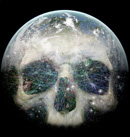 Human society is in jeopardy from the accelerating decline of the Earth’s natural life-support systems, the world’s leading scientists have warned, as they announced the results of the most thorough planetary health check ever undertaken. From coral reefs flickering out beneath the oceans to rainforests desiccating into savannahs, nature is being destroyed at a rate tens to hundreds of times higher than the average over the past 10m years, according to the UN global assessment report.
Human society is in jeopardy from the accelerating decline of the Earth’s natural life-support systems, the world’s leading scientists have warned, as they announced the results of the most thorough planetary health check ever undertaken. From coral reefs flickering out beneath the oceans to rainforests desiccating into savannahs, nature is being destroyed at a rate tens to hundreds of times higher than the average over the past 10m years, according to the UN global assessment report.
The biomass of wild mammals has fallen by 82%, natural ecosystems have lost about half their area and a million species are at risk of extinction – all largely as a result of human actions, said the study, compiled over three years by more than 450 scientists and diplomats.
Two in five amphibian species are at risk of extinction, as are one-third of reef-forming corals, and close to one-third of other marine species. The picture for insects – which are crucial to plant pollination – is less clear, but conservative estimates suggest at least one in 10 are threatened with extinction and, in some regions, populations have crashed. In economic terms, the losses are jaw-dropping. Pollinator loss has put up to $577bn (£440bn) of crop output at risk, while land degradation has reduced the productivity of 23% of global land.
“The health of the ecosystems on which we and other species depend is deteriorating more rapidly than ever. We are eroding the very foundations of economies, livelihoods, food security, health and quality of life worldwide,” said Robert Watson, the chair of the Intergovernmental Science-Policy Platform on Biodiversity and Ecosystem Services (Ibpes). “We have lost time. We must act now.”
The warning was unusually stark for a UN report that has to be agreed by consensus across all nations. Hundreds of scientists have compiled 15,000 academic studies and reports from indigenous communities living on the frontline of change. They build on the millennium ecosystem assessment of 2005, but go much further by looking not just at an inventory of species, but the web of interactions between biodiversity, climate and human wellbeing.
The report shows a planet in which the human footprint is so large it leaves little space for anything else. Three-quarters of all land has been turned into farm fields, covered by concrete, swallowed up by dam reservoirs or otherwise significantly altered. Two-thirds of the marine environment has also been changed by fish farms, shipping routes, subsea mines and other projects. Three-quarters of rivers and lakes are used for crop or livestock cultivation. As a result, more than 500,000 species have insufficient habitats for long-term survival. Many are on course to disappear within decades.


